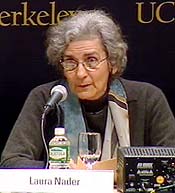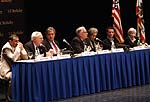Campus forum: Laura Nader
This is a transcript of the remarks delivered by Laura Nader at a forum of UC Berkeley faculty experts convened at Zellerbach Hall on April 1, 2003, to discuss the war with Iraq. Nader is a professor of social cultural anthropology and the author of numerous books on how central dogmas are made and how they work in law, energy, science, and anthropology.
 'Today we face the consequences of unilateral invasion of a sovereign country, which at the time of invasion posed no threat to the United States. It is, as my neighbor said, like taking a baseball bat to a bee's nest, playing free and easy with American lives.' —Laura Nader |
I think it's clear from our conversations with our families and friends that there is an uneasy feeling in our country — a feeling that somehow something unprecedented is happening. A Vietnam veteran put it more bluntly: "We've lost all three branches of government - the Judiciary when they selected the President, the Congress when they abdicated to the Executive Branch, the Executive when they refuse to listen to dissenting Americans."
There is an uneasy feeling in the country — our founding fathers placed the war-making power in the hands of Congress where decisions could be openly debated. Slowly we realize that a dozen unelected men and one woman are making decisions that will compromise the lives of American fighting forces, the lives of the Iraqis we say we want to liberate, the future of American schools, health care, our relations with old allies; the costs of war unfathomable.
Senator Byrd's "we stand passively mute" speech objected to Congressional abdication. Three branches of government are now one; objections by high-ranking military offices are muted — and all of this justified by unsubstantiated presuppositions fed to the public ad nauseum. 1) that Iraq has weapons of mass destruction and that they are linked with al-Qaeda; 2) that the rest of the world, including our NATO allies, is wrong; 3) that the Iraqis would welcome us as liberators — in spite of 12 years of sanctions and thousands of child deaths, in spite of daily bombing missions since 1991, in spite of an illegal invasion. Such prognostication is indicative of poor intelligence, an example of what happens when a president is isolated by a band of self-serving advisers.
How little we know of the Arab world, of Iraq and its people, of the place that Baghdad - the Florence of the Middle East - has in the hearts and minds of Arab peoples. Iraq, the Cradle of Civilization — how could we have thought that Iraqis would not defend their country from invasion? Why would the Shias in the south have welcomed the Americans when Shia Iran is also being threatened by the American administration.
How little we know about the Arab world. Do we really think there is no consequence of our double-standard foreign policy? One for Saddam Hussein, one for Ariel Sharon — both brutal men responsible for the death and destruction of innocent civilians. Hussein gassed the Kurds, Sharon killed 17,000 Lebanese civilians before he got to Sabra and Chatilla, to one side his provocation of the present intifada ... both fed by arms from the United States. Double standard — the attack on the U.S.S. Cole by Muslim terrorists was rightly condemned, but the U.S.S. Liberty in 1967 bombed by Israeli war planes was covered up by the Pentagon. Israel is the sole country in the region with weapons of mass destruction.
I've taught about the peoples and cultures of the Arab world at Berkeley since 1960. Presently I teach a seminar on what other civilizations think of the West, beginning with a Chinese Buddhist minister who went west to India in the 9th century. In teaching, I have been struck by the depth of ignorance about this large expanse of the world. In my research, I have noticed mirrored images. The Arab historians of the Crusades thought the Crusaders barbaric savages, ignorant of medicine, they had no culture, no civilization although they had technology. Gandhi said the same thing about the British — brute force.
Watch the Webcast |
Some years ago, the Middle East Center entertained a visit from Moroccan governors, I argued with one over their use of light-water nuclear reactors along the coast in the absence of Moroccan know-how making them dependent on the French, their former colonizers. In frustration, finally the governor blurted out, "The French? They have no culture, no civilization, but they do have technology (not the same as civilization)." This is an observation that we hear from Tokyo to Gibraltar and most recently from Japanese CEOs, and even more recently the Europeans refer to the U.S. as "the Extreme West" in making similar points.
In her new book, "Leap of Faith," Queen Noor of Jordan quotes George Bush Sr. as saying to her husband, "I will not allow this little dictator [Saddam Hussein] to control 25 percent of the civilized world's oil." Of course the key words here are "the civilized world." By their very nature, fundamentalists of all stripes consider their doctrines to be the truest, superior to all others, who fall into the category of uncivilized.
At the time of the first Gulf War, I was told by a distinguished Kuwaiti woman that the invasion of Kuwait was a family quarrel that should be settled by Arabs. Queen Noor tells us that King Hussein thought his peace effort was sabotaged; his mission was to avoid bringing Western troops into the region, which would trigger radical Islamicists. Why didn't we let the King of Jordan deal with the problem? If we had a Senator Fulbright today, he would say, "The arrogance of power." How is such arrogance expressed? In religious zeal — perhaps the Crusades have never ended; in militarism — the military-industrial complex that President Eisenhower warned about, independent of democratic decision-making; racism — the need for weaponry to be tested on somebody; and finally the powerful impact of intertwining fundamentalist Zionist ideology with American foreign policy, a position which under the Truman Administration, Secretary of Defense [James] Forrestal passionately warned is dangerous to the security of the United States.
Today we face the consequences of the unilateral invasion of a sovereign country, which at the time of invasion posed no threat to the United States. It is, as my neighbor said, like taking a baseball bat to a bee's nest, playing free and easy with American lives. The doubletalk is extraordinary. On the one hand we're bringing democracy to Iraq by means of a war not democratically declared. As is common, democracy promoters ignore the traditions of those they seek to assist and lack a grounded understanding of their own political democracy. Although it has been repeated ad nauseum that there is only one democracy in the Middle East, a recent study of Muslim and non-Muslim nations concluded that while few citizens of Muslim states enjoy democratic rights, there is roughly equal respect for democratic principles in Muslim and Western society.
All to say we must be on alert. Representations are amplified and coarsened by the mass media. The current United States invasion of Iraq can only exacerbate the vicious circle of anti-American and anti-Muslim or Arab stereotyping.
There are times when events compel nations to bring their actions to the test of principles. At such times, the truly patriotic citizen is forced to compare national ideals with immediate national purposes and policies. Decisions made at these crises points determine the fate of the nation — whether it rises further towards its ideals or moves away from them. As it stands now, under the leadership of Bush and Blair, we are proceeding to massive assaults in the midst of civilian population that eclipse the bombing of Hanoi. The actions taken under cover of the Patriot Act make the Palmer raids of the 1920s and the McCarthyite tragedies of the 1950s minor by comparison.
The silver lining in all this is the worldwide objection to unilateral war. The worldwide peace movement is a movement for global survival. Democracy has made great strides — people want to decide the fate of their world, sometimes in direct opposition to their governments and talk of nuclear strikes.
The peace protests have been our best citizen efforts at homeland security — not all Americans agree with the actions of their government. It is also true that peace protestors have been unsuccessful in communicating with our own government. Suggestions: we need to get specific. The media is obsessed with tactics and technology over political analysis. Embedded media may find it difficult to maintain an arm's length with government in order to question the official story. [New Yorker reporter] Seymour Hersh's reporting on Richard Perle and the Defense Policy Board and their ties with war profiteering is good investigative reporting, a tiny inroad towards dismantling the military-industrial complex. That these war profiteers operate unabashed in and out of government could be in our favor.
We need to be more politic on the international scene — our ambassador doesn't walk out of the U.N. because he doesn't like what the Iraqi ambassador is saying. We need to repair relations with the French, German and Russians who have closer ties to Iran and recognize their long-term oil contracts with Iraq, and with others through diplomacy not bribes.
Efforts at cultural exchange with the Arab world should be stepped up. In the late 19th century, Americans founded universities and colleges in Cairo, Beirut and Istanbul, a civilized way to introduce democratic thought and American goodwill, and a cheap investment compared with the use of military might. There is nothing inevitable about the military industrial complex. Remember the peace dividend? Just because Congress dropped it doesn't mean that citizens should. Our leaders might listen to dissenting voices as a way to avoid miscalculations, as a way to develop criteria for what it means to win or lose. Islam is the world's and America's fastest growing religion - 1.2 billion people should give pause to those who think only of military victories.
| Read the complete remarks by: Chancellor Berdahl Nezar AlSayyad Thomas G. Barnes David D. Caron Laura Nader Steve Weber Janet Yellen Q&A with audience |
When hostilities cease, there will be the challenge of rebuilding what we have destroyed and finding a graceful way out. Before the 1990 Gulf War, Iraq had a stable middle class, largest in the Arab world, education and healthcare were almost universal, women had achieved in the professions and elsewhere. For a post-conflict Iraq, there is no cultural sensitive plan as General MacArthur had before he entered Japan, where the first rule was "do not humiliate the enemy." We might learn from the 19th-century Americans who built universities, a civilized effort that does not require jeopardizing American lives. Most of all, Americans need to start practicing democracy. If we did, we wouldn't have to sell it. Government by the people and for the people, is the vision that the United States has given the world. Never before in history had a government been created with its main purpose as securing the rights that people had regardless of what the government said. The Bill of Rights was the first legal document in the history of the world to limit what the government could do and to secure those rights for individuals. That is something to remember.


